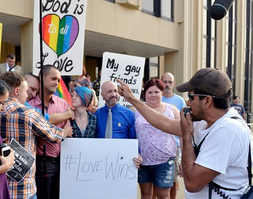The Virginia Supreme Court stepped in Monday and reversed a ruling dealing with spousal support and gay couples, ruling that a gay couple can be legally considered to have "a relationship analogous to marriage," and that, if they've been in one for a year, anyone paying spousal support to someone in that relationship no longer has to do so.
Since gay marriage was legalized in Virginia in 2014, the ruling is "the first appellate case that would interpret the word 'marriage' in a statute," said Claire Gastanaga, executive director of the Virginia chapter of the American Civil Liberties Union, which represented the ex-husband of a gay woman. "When you go for marriage equality, you get marriage equality. At the end of a relationship or the beginning of a relationship, it's all treated the same."
The ruling, written by Justice William Mims, reverses centuries of Virginia common law, which held that a legally recognized marriage could only occur between a man and a woman. The Virginia General Assembly, and then the voters of Virginia, approved a constitutional amendment in 2006 banning same-sex marriage, but the federal 4th Circuit Court of Appeals ruled that unconstitutional in 2014.
Michael Luttrell and Samantha Cucco of Fairfax County got divorced in 2008, after 16 years of marriage. Luttrell agreed to make monthly spousal support payments to his ex-wife for eight years as part of the divorce settlement. But those payments would terminate, the settlement stated, if Cucco engaged in "cohabitation" for at least a year.
In July 2014, shortly after the federal courts ruled that Virginia's anti-same-sex-marriage law was unconstitutional, Luttrell filed a motion with the Fairfax circuit court seeking to stop his support payments to his ex-wife; he said she had been living with and engaged to another woman since November 2012. He also asked for those two years of support payments to be paid back to him.
The case turned on a Virginia divorce law which was amended in 1997 to say if there is "clear and convincing evidence that the spouse receiving support has been habitually cohabiting with another person in a relationship analogous to a marriage for one year or more...the court shall terminate spousal support and maintenance."
But now-retired Fairfax Circuit Judge Charles Maxfield ruled that while "the Constitution may mandate that same-sex people have the right to get married" that "has [nothing] to do with termination of spousal support," which is "just a different issue." Maxfield said, "you have to be cohabiting. And cohabiting requires different sexes." He ordered Luttrell to keep paying.
Luttrell appealed, and lost again. In an opinion written by Appeals Court Judge Rossie Alston Jr., the court ruled that "neither the [Virginia] Supreme Court nor this Court has interpreted the phrase 'cohabitation, analogous to marriage'...to apply to same-sex relationships." Alston added, "we may presume the General Assembly intended the phrase 'cohabitation, analogous to marriage,' to be understood in the meaning previously determined by the Virginia courts -- as 'a status in which a man and a woman live together continuously.'" Therefore, Alston concluded, the court would "affirm the trial court's determination that...wife could not cohabit with another woman."
Wrong, said the state Supreme Court. They noted that a divorced woman who cohabits with another woman could collect spousal support, while a divorced woman who cohabits with a man could not. But the high court also looked at how the Virginia General Assembly amended the law in 1997, noting that the legislature eliminated the phrase "of the opposite sex" when providing for spousal support and added a gender-neutral phrase, "in a relationship analogous to marriage."
Mims wrote that the amended law recognized that "an individual who has entered a committed, financially interdependent relationship with a third person is no longer dependent upon his or her ex-spouse in the same manner as when the agreement was executed."
The Supreme Court sent the case back to Fairfax Circuit Court for a hearing on "whether Cucco cohabited with her fiancee" under the new interpretation of the law and whether Cucco must now pay Luttrell's attorneys fees, which Luttrell was initially ordered to pay for Cucco.
"I think it's a good thing," said Joseph Condo, a longtime Virginia divorce lawyer and former state bar president. "You can't be a cafeteria LGBT advocate and say, 'We want the same rights in marriage, but we don't want our alimony payments cut off.' It's logical, it's fair."
A Section on 05/03/2016
